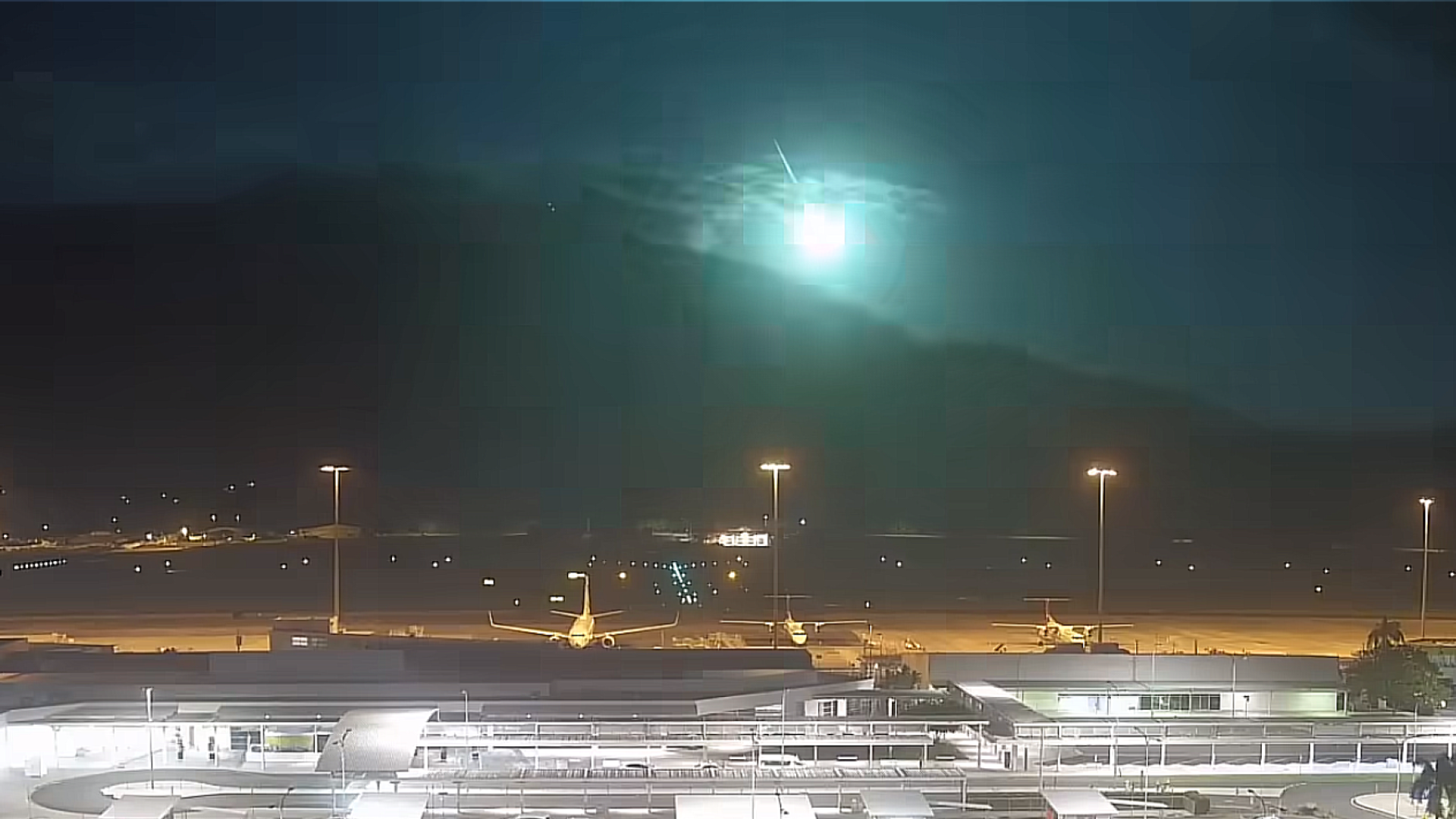https://sputnikglobe.com/20230522/watch-meteor-burn-bright-green-in-skies-above-australia-1110526333.html
Watch Meteor Burn Bright Green in Skies Above Australia
Watch Meteor Burn Bright Green in Skies Above Australia
Sputnik International
Security cameras in Queensland, Australia, captured footage of a meteor burning brightly in the skies overhead on Saturday night. The footage was posted on Facebook by Cairns Airport.
2023-05-22T21:41+0000
2023-05-22T21:41+0000
2023-05-22T21:36+0000
queensland
meteor
australia
cairns
beyond politics
https://cdn1.img.sputnikglobe.com/img/07e7/05/16/1110526448_0:0:1736:977_1920x0_80_0_0_1845ec2ebbccead82e54e58bd4041bb2.png
Security cameras in Queensland, Australia, captured footage of a meteor burning brightly in the skies overhead on Saturday night. The footage was posted on Facebook* by Cairns Airport, the international air hub in the state capital.In the background of the video, a bright white streak can be seen zipping down towards the Earth, which turns bright green as it burns up and gets exponentially brighter. Eventually, it disappears behind a nearby mountain and an even brighter flash can be seen emanating from the area.Soon, other videos that had also captured the phenomenon began pouring onto social media.The color a meteor burns as friction with the Earth’s atmosphere incinerates it is determined by its chemical content. Meteors that burn green, like that seen on Saturday, contain large amounts of magnesium ores, while those that contain primary iron burn yellow.According to local media, the Queensland authorities are unsure if the meteor impacted the Earth or exploded, and have mounted a hunt for the meteorite. About 17,000 meteorites survive the perilous journey through Earth’s atmosphere each year, although essentially all are very small and insignificant, aside from a scientific curiosity. Events like the explosion of a meteor over Chelyabinsk, Russia, in 2013, or larger ones like the Tunguska Event in 1908 or the Chicxulub impact 65 million years ago, are exceedingly rare and carry more significant effects for the planet.*Meta and Facebook are banned in Russia over extremist activities.
queensland
australia
Sputnik International
feedback@sputniknews.com
+74956456601
MIA „Rossiya Segodnya“
2023
News
en_EN
Sputnik International
feedback@sputniknews.com
+74956456601
MIA „Rossiya Segodnya“
Sputnik International
feedback@sputniknews.com
+74956456601
MIA „Rossiya Segodnya“
meteor; cairns; queensland; australia
meteor; cairns; queensland; australia
Watch Meteor Burn Bright Green in Skies Above Australia
Meteors are asteroids or specks of interstellar dust that glow brightly as they fall to Earth, heating up in the planet’s atmosphere. Even a small rock can contain large amounts of energy, with the 59-foot-wide Chelyabinsk meteor creating an explosion equivalent to 500 kilotons of TNT.
Security cameras in Queensland, Australia, captured footage of a meteor burning brightly in the skies overhead on Saturday night. The footage was posted on Facebook* by Cairns Airport, the international air hub in the state capital.
In the background of the video, a bright white streak can be seen zipping down towards the Earth, which turns bright green as it burns up and gets exponentially brighter. Eventually, it disappears behind a nearby mountain and an even brighter flash can be seen emanating from the area.
Soon, other videos that had also captured the phenomenon began pouring onto social media.
The color a meteor burns as friction with the Earth’s atmosphere incinerates it is determined by its chemical content. Meteors
that burn green, like that seen on Saturday, contain large amounts of magnesium ores, while those that contain primary iron burn yellow.
According to local media, the Queensland authorities are unsure if the meteor impacted the Earth or exploded, and have mounted a hunt for the meteorite.
About 17,000 meteorites survive the
perilous journey through Earth’s atmosphere each year, although essentially all are very small and insignificant, aside from a scientific curiosity. Events like the explosion of a meteor over Chelyabinsk, Russia, in 2013, or larger ones like the Tunguska Event in 1908 or the Chicxulub impact 65 million years ago, are exceedingly rare and carry more significant effects for the planet.
*Meta and Facebook are banned in Russia over extremist activities.


